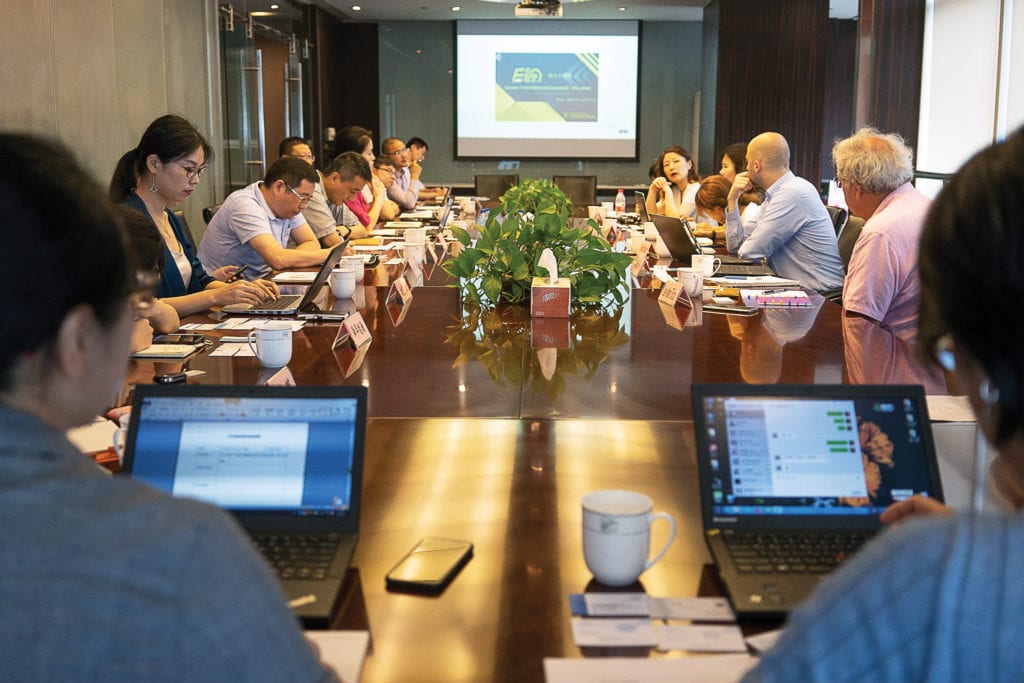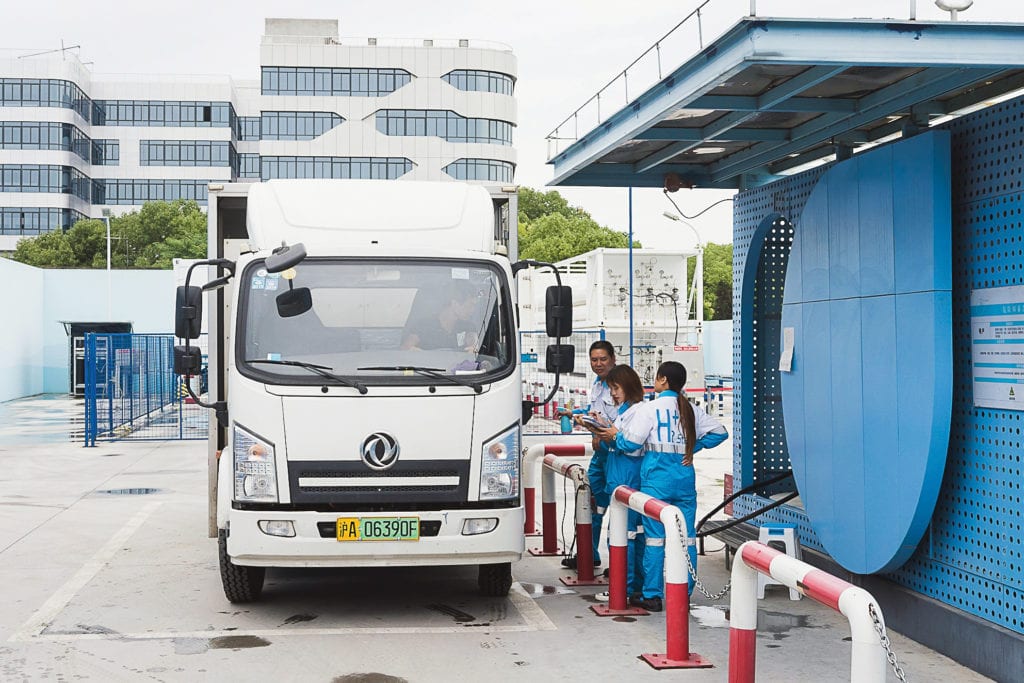Finding Opportunities in Post-crisis China
Several months after the COVID-19 peak in China, the country has been working intensively to recover its production capacity in multiple sectors, including hydrogen technologies. However, a significant part of the globe is still under strict measures to overcome the pandemic stage. That leaves one of the most powerful manufacturing capabilities in the world in a challenging situation to reach international consumers while depending significantly on its internal economy to recover.
Podcast with Jean-Marc Tixhon, Louis-Philippe Lammertyn and Marie Kress. Source: Smart mobility podcast
Hydrogen mobility and fuel cell industry have been the main sectors to reframe their strategy in the last few months. China’s interest in establishing the foundations for a mature H2 internal market is highlighted with several initiatives that will probably scale up their capacity to fulfill international markets upon recovery of the global economy. For example, their effort was clearly represented by the Notification of Improvement of New Energy Vehicles Popularization (Notification 2020) announced by Chinese authorities in April this year, which provides special subsidies to fuel cell vehicles and industrial production lines intending to improve their commercial models. Moreover, China’s Industrial Hub HEBEI approved 43 different hydrogen projects with an estimated investment of 1.2 billion USD. These efforts are also visible at the local scale. Guangzhou, capital of south China’s Guangdong Province, has announced a 10 year hydrogen strategy structured around the construction of an energy industrial system based on hydrogen, with an estimated value of 8,5 billion USD by the end of 2025. Beijing Public Transport Group has also promised to purchase more than 2,500 hydrogen city buses, and other provinces, such as Hebei, have planned to build 30 refueling stations to supply the demand of 4,000 new fuel cell vehicles by 2022.

China’s interest in the development of a strong hydrogen market focused on sustainable mobility has triggered the attention of international companies with an opportunity to explore cooperation mechanisms towards technical breakthroughs and investments in a post-crisis scenario. Recently, Toyota signed a joint venture with the Chinese companies Dongfeng, FAW, GAC, BAIC, and Yihuatong for research and development in fuel cell technology, aiming to promote domestic vehicle consumption. On the other hand, the multinational chemical company Linde and a subsidiary of the China Power International Development Ltd signed a Memorandum of Understanding for the generation of several green hydrogen initiatives in the medium term, including the research and implementation of clean mobility solutions for the Winter Olympics hosted by China in 2022.
The EU Hydrogen Green Deal and China’s recent commitments to Hydrogen for mobility represent a significant opportunity to accelerate hydrogen and fuel cell adoption.
These strategic alliances are consolidating a new paradigm in the business relations with China, currently evolving from the traditional mass production at a low-cost perspective to a more complex and dynamic collaboration that is also opening the Chinese market to multiple international players. That is the case with eCap Mobility, a highly recognized German company that has created a partnership with Re-Fire – one of the most recognized Chinese fuel cell providers – for the use of innovative clean hydrogen technologies in the maritime transportation sector. The partnership is focusing on a technology transfer model, allowing the two companies to expand their markets beyond their current scope and improve the fuel cell supply chain worldwide.
Developing resilient supply chains
According to our international experts, there are three main opportunities to leverage and strengthen the fuel cell technologies for mobility, and the component’s supply chain in China: the increasing global importance of consolidating international alliances between manufacturers, producers and end-users while keeping the strategic development of the regional markets; the need to improve supply chains and market strategies to consolidate multilateral business agreements; and the price volatility of the non-renewable sources in periods of crisis. All of which highlight the importance of developing sustainable and more economically resilient alternatives for global energy contingencies over time. These foreseeable opportunities for the Chinese market are also aligned with the economic recovery initiatives, especially in Europe, but extended to other regions such as Latin America, North America, and the MENA Region.

First, China’s renewed interest towards international strategic alliances to reinforce their hydrogen and fuel cell markets will still play an important role when positioning as an international technology producer beyond the internal demand. This coincides with European and other regions interest in reactivating their economies through significant investments in renewable energy. For instance, the EU Hydrogen Green Deal and China’s recent commitments to Hydrogen for mobility represent a significant opportunity to accelerate hydrogen and fuel cell adoption that jointly considered, increases the feasibility of achieving the energy transition goals in each region.
Second, despite China’s remarkable industrial performance that continues to grow despite the ongoing crisis – with factories such as the Jinhua Project with a future capacity to produce 20,000 fuel cell engines per year – supply chains and go-to-market strategies for hydrogen mobility remain a challenge for Chinese producers even at the internal level. European companies have developed a considerable background in the formulation and implementation of studies and entry-market strategies that have been strongly supported by regulatory frameworks, innovative funds, and market-driven policies to promote the industry locally and internationally. A co-working formula enhancing the Chinese manufacturing capacity and the European market strategies could not only strengthen China’s supply chains, but also promote the growth of the global hydrogen market to a more mature stage.
A unique opportunity
Lastly, the COVID-19 economic crisis has demonstrated the price volatility of non-renewable resources. According to the IEA, oil and gas investment were expected to fall by almost one-third at the end of the year after petroleum reached its lowest price in history, falling to negative 37.63$ in April 2020. This unique macroeconomic situation has reinforced the global interest towards hydrogen and fuel cells, and as mentioned, China and the EU have been taking outstanding steps to consolidate their industrial leadership. The EU has launched its European Hydrogen Strategy and presented the Clean Hydrogen Alliance, which expects a cumulative investment on green hydrogen from €180 to €470 billion by 2050. Adding that to the previously mentioned Chinese Notification 2020, the new Energy Law that classifies hydrogen as a fuel for all types of vehicles – apart from other new policies linked to hydrogen development – is creating a new playing field where the private sector could take advantage of political support to accept higher risk for their investments and bilateral commercial agreements.
These geopolitical and economic circumstances provide a unique opportunity for businesses and governments in a post-crisis world. Through industrial symbiosis, strengthening supply chains and a move away from traditional linear economic models, China and the world can emerge even stronger than before the COVID-19 pandemic. One thing is clear – it will be hydrogen that fuels the change.